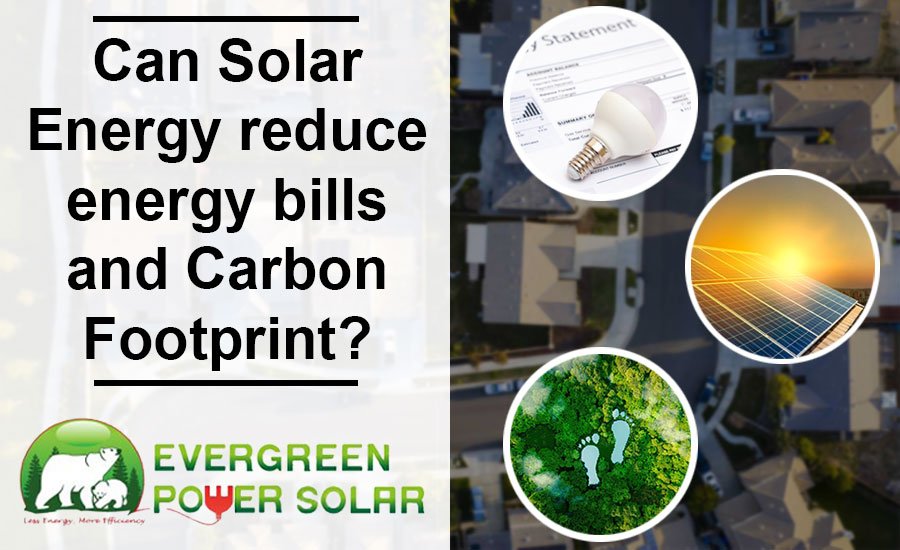Can Solar Energy reduce energy bills and Carbon Footprint?
Solar panels are used to convert solar energy into electrical energy and hence reduce carbon footprint.
Solar energy is converted into electrical energy and stored in solar batteries for consumption in the later future or during odd hours when sunlight is not available.
Fortunately, there are many things we can do to adopt greener behaviours, ranging from easy fixes to more involved initiatives like installing solar panels for your home.
This article will concentrate on the reduction of carbon footprint and offer you a simple way to minimize it and lower your energy expenses.
Reducing Carbon footprint: Our carbon footprint is the total of all CO2 emissions that you are responsible for during a specific time or maybe for a single year.
The entire amount of greenhouse gases created to support human activities is known as a person’s “carbon footprint,” and it is typically stated in equivalent tonnes of carbon dioxide. Transport, land clearing, the production and consumption of food, fuels, manufactured goods, timber, roads, buildings, and services are all possible sources of greenhouse gas emissions.
Simply put, depending on how much fuel is used and how far you drive, a car’s engine consumes fuel while you drive, emitting a set quantity of CO2.
When you use oil, gas, or coal to heat your home, you also produce CO2 emissions. Even if you use electricity to heat your home, the process of producing the electricity may have released some CO2.
Benefits of Availing Solar Energy
- Reduction in Water Pollution
- Less CO2 Emissions
- Lowers Carbon footprint
- Reduced Greenhouse Gas Emissions
- Zero Maintenance Cost
- Reduce the electricity bills
- No Air Pollution
How carbon footprint can be lowered with Solar Panels?
We have a variety of options for lowering our CO2 emissions. Some actions are as easy as buying organic food, remembering to always turn off the lights when not in use, and substituting walking or bicycling for driving whenever possible.
You can also make some long-term adjustments, such as purchasing solar panels to harness the sun’s energy for use as heat or electricity.
By offering a clean and renewable source of energy, solar power lowers CO2 emissions. Your home has solar panels that absorb solar energy and turn it into useful electricity. Because the energy may be stored on the grid for later use, this process does not depend on fossil fuels or other materials, and none of the energy is lost.
Additionally, since PV panels don’t require water to function like other industrial processes do, using solar energy reduces water pollution.
Solar energy produces electricity without the use of local water resources and does not damage our waterways the way fossil fuels do.
You can significantly lower your household’s carbon footprint, or the overall amount of greenhouse gases, by adopting a solar energy system.
For instance, driving less, consuming more organic and locally grown food, starting a garden, line drying clothes, and turning off your electronic appliances when not required are some other methods towards change.
Do solar panels influence the supply of electricity?
If installed properly, when your solar panels are not producing enough electricity, your system should easily switch from using the electricity they have produced to the use of energy from the National Grid. Your electrical supply won’t change in any way. There is no need to notify your energy provider if you utilise solar panels in addition to a standard energy plan. Simply put, you will use less electricity from the grid and have reduced costs as a result.
What should you think about before selecting solar panels?
Assess whether your property is suitable before having solar panels placed, including whether it is sufficient and how much light it receives.
Additionally, you might want to consider setting up an energy storage system or solar battery to keep the energy your solar panels produce. You can do this to store electricity produced during the day to utilise at night, increasing your independence and lowering your dependence on outside energy sources.
Although installing solar PV panels typically does not require planning approval, it is still a good idea to check with your local government in case there are any restrictions, such as if you reside in a conservation space.
Additionally, you should let your house insurance company know so they can confirm that they will cover solar panels and determine whether your premiums need to be adjusted.
Finally, be sure to compare solar installation prices by requesting several estimates from several companies.
How can solar panels be used most effectively?
- Increase your daytime electricity use
- Use a solar storage battery
- Cut down on energy waste to lower your energy costs.
- Clean your solar panels regularly- either install automatic cleaners or purchase a solar panel cleaning kit.
Conclusion
Solar energy reduces energy bills and also carbon footprint to a greater extent.
There are additional steps you can take to lessen your carbon footprint in addition to utilising solar energy such as increasing your home’s insulation, window layout, and shading.
You might experience some difficulty locating the ideal solar experts for your household. On our website- Evergreen Power Solar you may ask for a reasonable quote in addition to receiving crucial information about green energy sources to make an informed decision.
For those who live in the UK, it is a blessing that the cells don’t need direct sunshine to function they can still produce some electricity during gloomy days.

